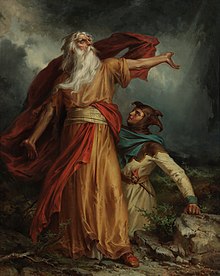
The Tragedy of King Lear, often shortened to King Lear, is a tragedy written by William Shakespeare. It is loosely based on the mythological Leir of Britain. King Lear, in preparation for his old age, divides his power and land between his daughters Goneril and Regan, who pay homage to gain favour, feigning love. The King's third daughter, Cordelia, is offered a third of his kingdom also, but refuses to be insincere in her praise and affection.[1] She instead offers the respect of a daughter and is disowned by Lear who seeks flattery. Regan and Goneril subsequently break promises to host Lear and his entourage, so he opts to become homeless and destitute, and goes insane. The French King married to Cordelia then invades Britain to restore order and Lear's rule. In a subplot, Edmund, the illegitimate son of Gloucester, betrays his brother and father. Tragically, Lear, Cordelia and several other main characters die.
The plot and subplot overlap and intertwine with political power plays, personal ambition, and assumed supernatural interventions and pagan beliefs. The first known performance of any version of Shakespeare's play was on Saint Stephen's Day in 1606. Modern editors derive their texts from three extant publications: the 1608 quarto (Q1), the 1619 quarto (Q2, unofficial and based on Q1), and the 1623 First Folio. The quarto versions differ significantly from the folio version.
The play was often revised after the English Restoration for audiences who disliked its dark and depressing tone, but since the 19th century Shakespeare's original play has been regarded as one of his supreme achievements. Both the title role and the supporting roles have been coveted by accomplished actors, and the play has been widely adapted. In his A Defence of Poetry (1821), Percy Bysshe Shelley called King Lear "the most perfect specimen of the dramatic art existing in the world", and the play is regularly cited as one of the greatest works of literature ever written.[2][3][4]
- ^ "King Lear Plot Summary | Shakespeare Learning Zone | Royal Shakespeare Company". rsc.org.uk. Retrieved 29 October 2023.
- ^ "A Defence of Poetry by Percy Bysshe Shelley". 17 December 2022.
- ^ Burt 2008, p. 1.
- ^ "Top 100 Works in World Literature by Norwegian Book Clubs, with the Norwegian Nobel Institute – the Greatest Books".